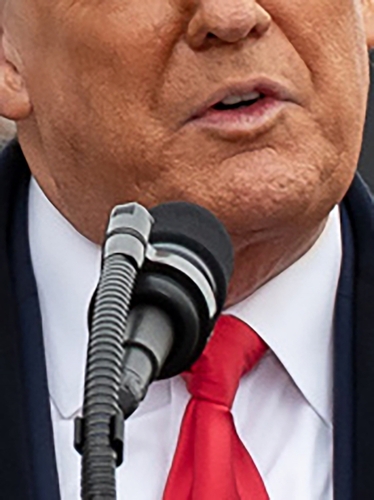Terrorism takes many forms - from violent high-profile attacks to sophisticated cyber-intrusions. Yet there is another, more insidious form of terrorism - one practiced by President Trump that was on full display on Jan. 6 on Capitol Hill. It is called stochastic terrorism.
Stochastic terrorism is a process in which a speaker makes comments that promote terrorism without explicitly asking people to engage in violence.
By keeping their statements implicit, stochastic terrorists maintain plausible deniability if violence actually occurs.
For example, in spring of last year, Trump tweeted “LIBERATE MICHIGAN!” in response to Michigan Gov. Gretchen Whitmer's orders to slow the spread of coronavirus. She was later targeted for kidnapping by violent right-wingers whose motivations echoed Trump's Twitter tirade.
When confronted with the possibility that he may bear some responsibility for their action, Trump only complained that Whitmer did not thank him for the FBI's arrest of the extremists.
* * *
Despite events like this, Republicans have long balked at reckoning with the effects of Trump's language, hesitant to hold him accountable and content to assume that implicit support for violence could never result in actual bloodshed.
When he celebrated a Republican congressman attacking a reporter, his crowd cheered. When he called neo-Nazis “very fine people,” the racist elements of his supporters were emboldened. And most recently, when he encouraged “wild” protests in Washington on the day that electoral votes were to be certified, his supporters listened.
In the wake of the 2020 Presidential election, as Trump intensified his lies about fraud, one anonymous Republican even asked, “What's the downside in humoring him for this little bit of time?”
For that anonymous source and all those who remained silent, the disgrace in Washington during the week of Jan. 6 provides an answer.
As a professor of communication, my teaching and research is based on a fact that has been clear since the days of Socrates - words have consequences.
Trump has spent the better part of his presidential tenure using words that chastise, demonize, ridicule, accuse, and dehumanize his political adversaries. He has also used words to whine, bellyache, gripe, and complain about alleged “unfair” treatment that he has endured.
And while it is easy to dismiss his braying as harmless, decades of research show us that audiences make decisions based on the messages they encounter. Messages we consume affect our attitudes about whether a behavior would benefit us, change our understanding about what is “normal” behavior, and persuade us that we have the ability to engage in that behavior.
In online right-wing echo chambers, Trump's baseless claims have reinforced the notion that the election was stolen and that those who think otherwise are enemies of the United States.
By surrounding themselves with like-minded people in these electronic echo chambers, vulnerable audiences come to believe that the president's statements represent a normal way of thinking. Trump's encouragement of action on the part of his base boosts their beliefs that they can change the election's results.
Using a steady stream of implicitly violent statements and disinformation targeting political enemies, Trump has nurtured an audience whose shameful behavior we witnessed in Washington.
* * *
To prevent these kinds of events, we must call the chaos on Capitol Hill what it was - an attempted coup, an insurrection and, according to the FBI's definition, domestic terrorism. In doing so, we must also recognize President Trump for what he is - a stochastic terrorist.
Even as the newly minted domestic terrorists paraded Confederate flags and Trump banners through the halls of Congress, President Trump released a video statement, repeating his lies about a stolen election, expressing sympathy with his supporters' feelings, and halfheartedly telling them to go home.
In what should have been an unmistakable rebuke of the day's violence, Trump reinforced the very ideas that instigated the mayhem. It was yet another provision of implicit encouragement for those who engaged in political violence in support of his lies.
“We love you,” he told them. “You're very special people.”
* * *
By 1 a.m., the streets surrounding the Capitol had quieted and Congress had officially certified the election of Joe Biden, but the effects of Trump's words continued to be uncovered throughout the night. A truck was discovered to contain several guns and bomb-making materials. Pipe bombs were found outside the headquarters of the Democratic and Republican National Committees.
And the electronic echo chambers continued to whir, encouraged by a President, a stochastic terrorist, who is happy to offer tacit support for the damage his violent supporters have done - and may yet do - to our republic.
